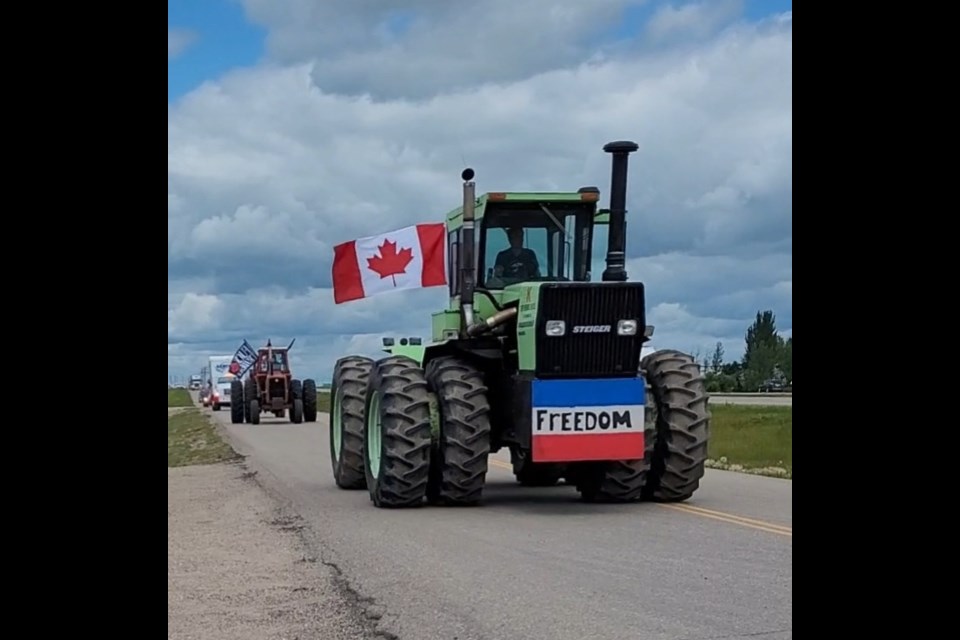Concerned that world governments are attacking farmers’ ability to grow food and feed the planet, more than 100 vehicles slowly rumbled from Moose Jaw to Regina recently to support those producers.
A mix of tractors, semi-trucks, half-tons and cars gathered near the Peanut Hills Campground on July 23 as part of the nationwide Farmers’ Slow Roll Protest. Supporters from Swift Current and Regina gathered in The Friendly City before heading to The Queen City.
About 60 similar events occurred across Canada that day.
The event was in response to restrictions that the Dutch government is forcing on its farmers to reduce nitrogen use by 30 per cent by 2030. The Canadian government also plans to impose the same restrictions in this country.
Robin Mitchell was one of several hundred people who attended the event and thought it was amazing. She is from a farming family and works on a farm as a second job. She learned that governments — including Canada’s — want farmers to reduce their fertilizer use, which would decrease the amount of food and crops they grow.
“All this talk of these cricket farms and stuff, I like my beef. I order up my beef from my local family farmer,” she said. “I think we’re going down a bad path here and I was definitely going out to support (the Dutch and Canadian farmers).”
The Moose Jaw group travelled roughly 30 kilometres per hour and arrived in Regina after two hours.
“There were people on the side of the road supporting us and honking,” Mitchell said. “This is important. There were very few — only a couple of people — who flipped us the bird that I guess don’t like eating.”
The cavalcade ended at the Northgate Mall because access to the Legislative building was blocked. Several people spoke at the rally while a few musicians performed.
“I’m very worried about the direction our country is going. I’m going to die standing on my feet and not on my knees,” Mitchell added. “I’ll keep trying to spread the word and keep trying to raise awareness.”
In a video posted to his Facebook page, event organizer Mark Friesen explained international policy is being forced on farmers worldwide as part of the United Nations’ Sustainable Development agenda, to which Canada adheres.
“If it’s going to decimate the smaller farms throughout Europe, it’s really going to decimate the large farms here in Saskatchewan (and the rest of Canada) … ,” he said. “And it’s our food that’s going to be affected by this, so we have to do something.”
Standing with farmers is one act to take, which ensures that the federal government pays attention since it will face frustrated citizens, Friesen continued. He was also concerned that premiers were silent on this issue and thought they needed to stand up for voters.
While the prime minister has accused Canadian farmers of being major polluters, Friesen pointed out that the latter are some of the cleanest and most productive people on Earth. Furthermore, he noted that nitrogen has helped feed the planet and avoid famine.
“We need to say no (to reducing it), we need to be firm, and our politicians need to stand for our farmers’ livelihoods and our food,” he said.
The carbon tax is killing farms, the agriculture industry, and families, while demonizing it is wrong since carbon dioxide is a fundamental building block of life, Friesen said. It makes no sense to penalize citizens with this tax since Canada produces 1.6 per cent of the world’s pollution.
A recent study in the medical journal The Lancet showed that more carbon dioxide encourages more vegetation growth, he added. So, he thought bigger issues were at play than just reducing nitrogen.




